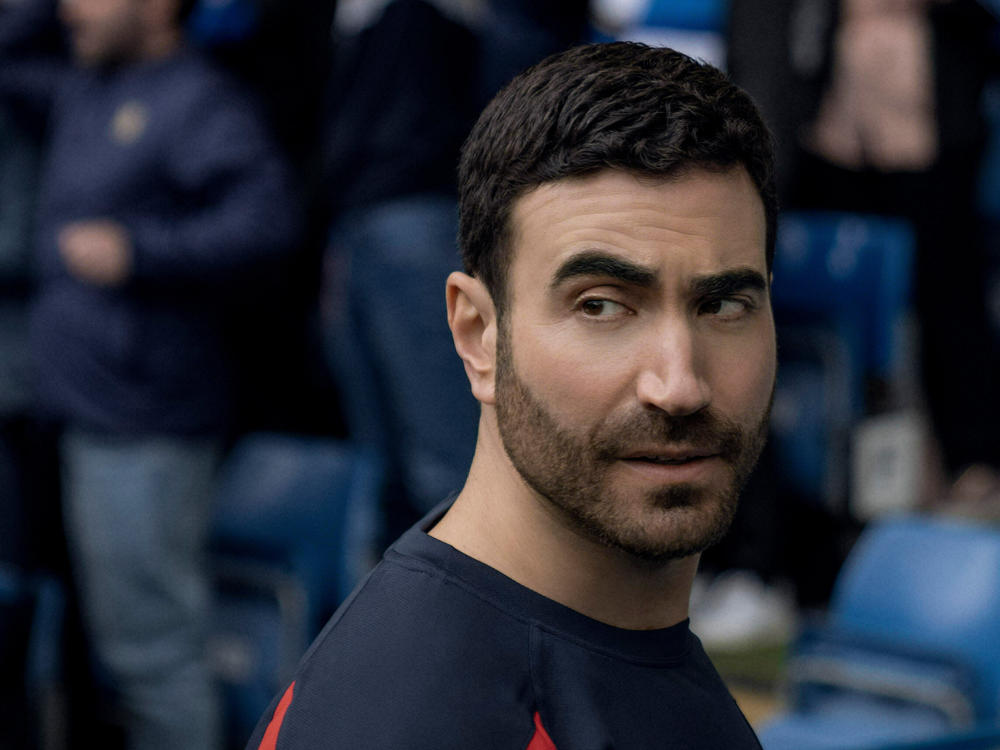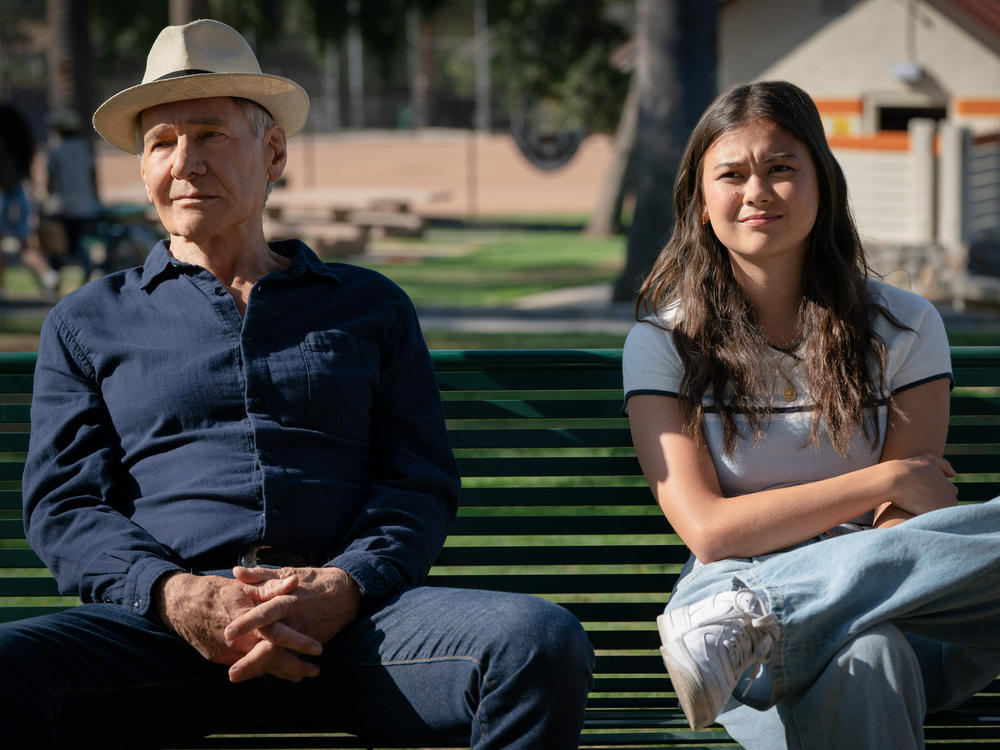Section Branding
Header Content
Take it from real-life Roy Kent: Soccer is catharsis for people who won't do therapy
Primary Content
The Apple TV+ series Ted Lasso is a bit of a Trojan horse. On its surface, it's a fish-out-of-water show about sports, in which an American football coach moves to the U.K. to coach a different kind of football (a.k.a. soccer). But the series, now in its third and reportedly final season, also takes on themes of loss, masculinity and the relationships between fathers and sons.
Brett Goldstein is a writer for the show, and he's also won two Emmy awards for playing Roy Kent, a gruff yet lovable retired footballer-turned-assistant coach. Goldstein says his character is reminiscent of the footballers he knew growing up in the U.K.
Goldstein describes Roy as a man raised in a "toxic, masculine environment," whose position as a midfielder emphasized blocking other players. Now that Roy's retired, Goldstein says, "he has all this emotion in him, but he has repressed it for all these years, and he finds it very, very difficult to be vulnerable."
In the series, soccer provides a space for Roy (and other men) to access their emotions — a notion that Goldstein finds very relatable.
"Men, traditionally aren't great about looking each other in the eye and talking about their feelings," he says. "I think sport is there so men can say 'I love you' without saying 'I love you.' "
For Goldstein, working on Ted Lasso, and knowing the series is coming to a close, was an emotional experience that sometimes brought him to tears. "Some of the magic of it is that [the people creating the show] all care about it as much as you care about it. ... We're so grateful to be there. And it's fun, it's not like it's like a grind. It's really good people working on something that we think is really good and we really care about."
Goldstein also co-created the Apple TV+ series Shrinking, which stars Jason Segel, Harrison Ford and Jessica Williams as three therapists who share a practice.
Interview highlights
On starting out as a writer for Ted Lasso and suggesting himself for the role of Roy Kent
I had done a pilot with Bill Lawrence, one of the co-creators, a few years before, and we'd stayed in touch. And he knew I was a writer. And he called me and said, "Do you wanna come write on this TV show about football? We need a British guy." And I said, "Sounds interesting." And I met with Jason Sudeikis [who plays Ted Lasso] on FaceTime, and then we fell in love. And then I was like, "Yes, I really, really want to do this."
And I went over and was writing Ted Lasso with the team. And as we were writing it, I started to think, "Oh, I think I'm Roy Kent," but I also knew no one in the room was thinking of me for obvious reasons. And I didn't want to make anyone uncomfortable. And I knew it was going to be awful if I just suddenly said in the writers' room, "What about me for Roy Kent?" I knew everyone would just be like, everyone would just look at their hands and be like, "Yeah, good idea. Let's think about it."
So I waited until we'd finished in the writers' room and I made a self tape of five scenes and ... as I flew back to London, I sent an email and I said, "Look, I know this is really awkward, so if this is terrible and embarrassing, you can pretend you never got this email and I will never ask about it. But I think I could be Roy. And so I've made you this video, and if you think it's good, then great." And I sent the email, I flew back to London, and as I landed, I got an email saying, "This is brilliant."
On the ways in which Roy's story resonated with him
My dad is ... very, very obsessed with football, and I always grew up around footballers and around football. And we had friends of the family who were professional footballers and, ... as I was a kid, they were getting older and coming to the end of their careers. ...
Football is very specific, where you start very, very young. You live this quite insane life ... that makes you special, this kind of amazing thing. And then in your 30s, it starts to come to an end. And not only is that difficult, but you don't really have any other life skills. You've been living in this sort of weird bubble. ... You don't want it to end. You had no plan, but your body doesn't agree, you know what I mean? But then again, I think that that's also a universal feeling, a feeling of aging. And you don't want to age, but your ... knees don't work as well as they used to. And there's something sort of tragic about that.
On how sports can enable conversations between men
You're looking at drama happening in front of you and you can talk about things because you don't have to look at each other. And if anything gets emotional, it can kind of be blamed on what's happening on the pitch, you know what I mean? ... It's like if we don't look at each other, and we can face this way, then we can talk. And I'm always fascinated ... when I see really, really repressed, difficult men, but I see them at a game where they're singing and they're screaming and they're shouting and they're crying — and it's like this whole catharsis for them, these feelings that they can't process in the week. Sometimes I think football is like a therapeutic good for the world, for people who can't ever bring themselves to go to therapy.
On why he's interested in writing about the therapist-patient relationship in Shrinking
I think that it's inherently so kind of dramatic and interesting. It's quite a unique relationship between a therapist and a patient. The fact that they can know more about you than anyone, maybe, if you're being honest with them. And yet it's professional and you're paying them to listen and there are boundaries. ... This relationship can go on for years and years. Some people have the same therapist for 40 years or something. ... There's no other relationship like it, I don't think. There's no equivalent. ... All those boundaries and playing with them in a dramatic context is fun and juicy.
On incorporating comedy into a show about death and grief
We got asked this a lot when we were making Shrinking, like, how is this a comedy? And I get when you lay out the plot, there's nothing funny in the plot of it. And the people talk about the tone of it. How do you get that tone right? And it's just how I see life. Everything is funny or sad, and it's both. It's how we cope and I think it's how my brain works. But I also know it's everyone's story. Nearly everyone can tell you if they've been with a loved one on their deathbed, there'll be a moment within that week that they were there where they were laughing hysterically. They were crying with laughter.
Audio interview produced and edited by: Lauren Krenzel and Seth Kelley. Audio interview adapted for NPR.org by: Bridget Bentz, Molly Seavy-Nesper and Beth Novey.
Copyright 2023 Fresh Air. To see more, visit Fresh Air.
Bottom Content





